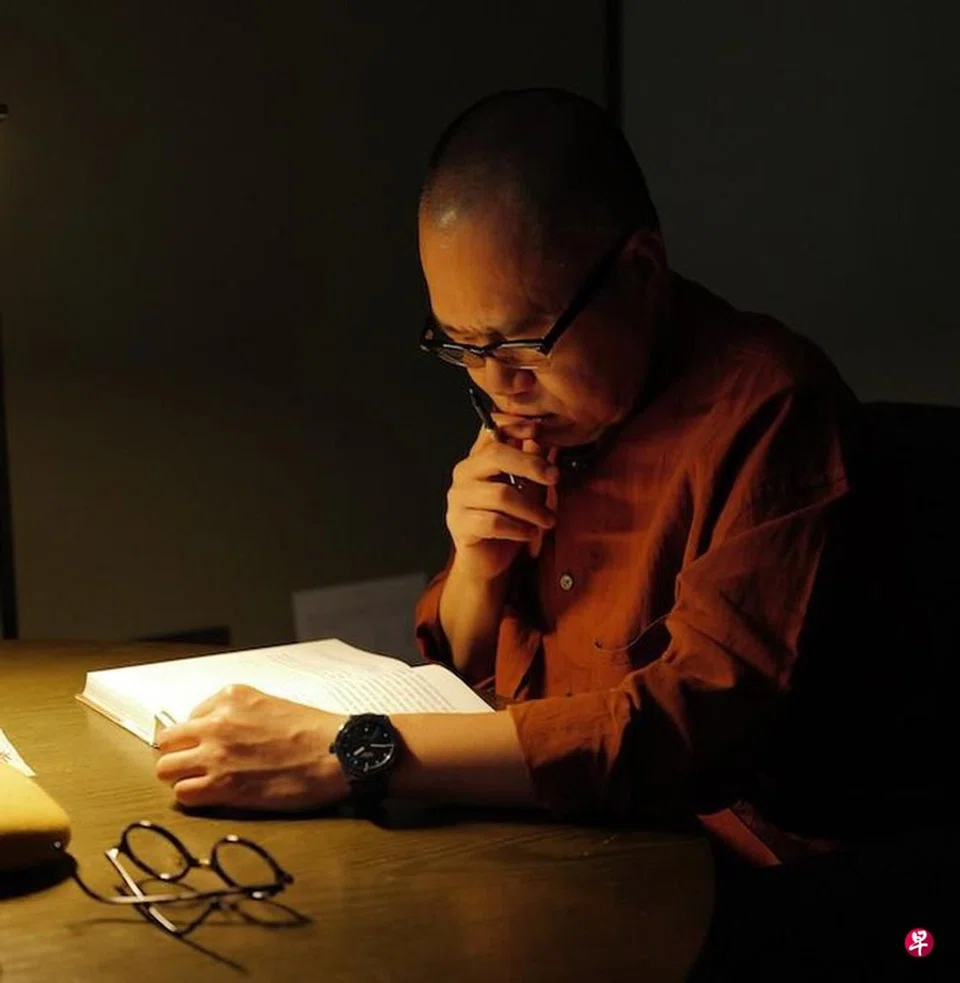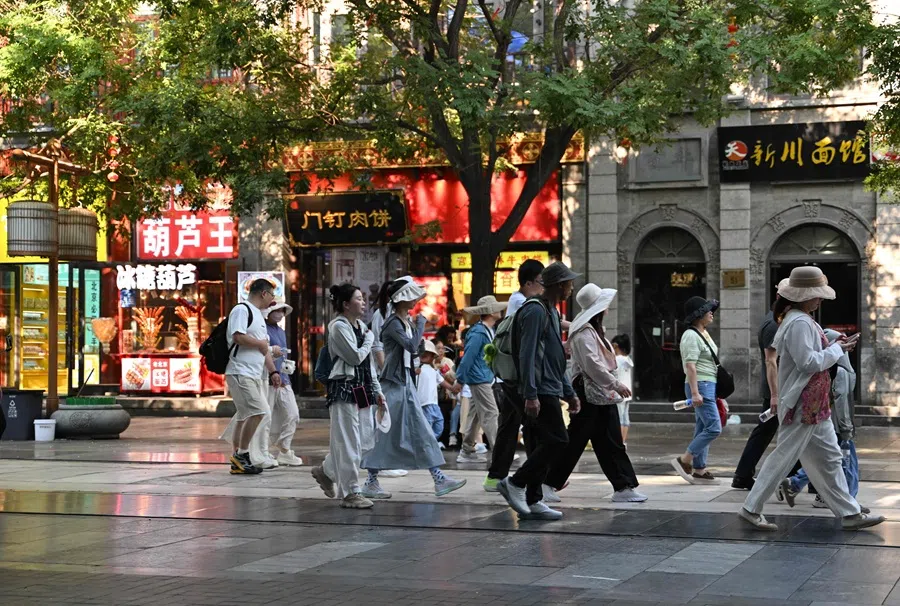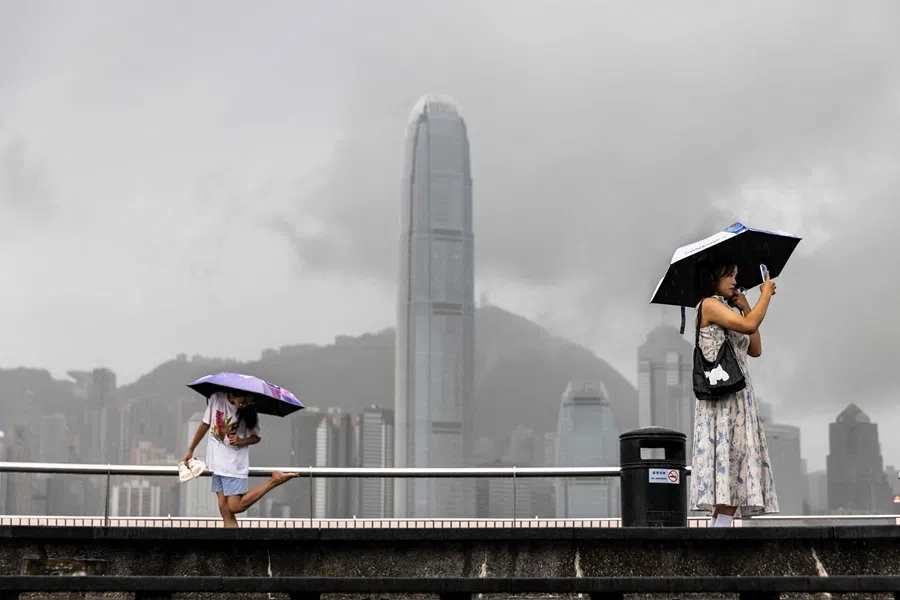Leung Man-tao’s podcast was erased. The message is loud and clear.
After Leung Man-tao’s podcast Eight and a Half vanished from major platforms in China, listeners are left questioning the limits of expression — even for careful and moderate voices. Lianhe Zaobao senior correspondent Chen Jing tells us more.

“I apologise that you’ve had to make such an effort just to tune in.”
Listeners of the podcast Eight and a Half finally heard from its popular host, veteran Hong Kong media figure Leung Man-tao, in late August, when an image began circulating online hinting at his return. The podcast had been completely removed from platforms within China.
The image showed Leung recording in front of a microphone, and scanning the embedded QR code directed listeners to a webpage where he shared his thoughts about the situation. He apologised to listeners and partner platforms and outlined a potential plan to distribute eight unpublished podcast episodes via email. However, he did not explain the reasons behind the show’s removal, leaving listeners to speculate that a recent episode may have crossed a censorship line.
At the end of the episode, Leung lamented that the era of the “Four Great Talents” coincided with Hong Kong’s golden age. In contrast, he remarked, “I’ve never seen Hong Kong so destitute in my lifetime.”
Hong Kong and its ‘Four Great Talents’
In the episode titled Why People Miss Chua Lam So Much, which aired on 2 July, Leung began by discussing Chua’s death and shared anecdotes about the lives of Hong Kong’s “Four Great Talents” — wuxia novelist Jin Yong, science fiction writer Ni Kuang, lyricist James Wong and food critic Chua Lam.
He reflected on Hong Kong’s past social environment and subtly referenced two sensitive figures: Jimmy Lai, the imprisoned founder of the pro-democracy media outlets Next Magazine and Apple Daily, and former pro-democracy convener Tanya Chan, who was convicted by a Hong Kong court.

At the end of the episode, Leung lamented that the era of the “Four Great Talents” coincided with Hong Kong’s golden age. In contrast, he remarked, “I’ve never seen Hong Kong so destitute in my lifetime.”
He observed that current Hong Kong officials are most concerned about the rise of “soft resistance” in society following the introduction of the national security law. “Against such a backdrop, people miss that era when things were unrestrained to the point of excess.”
In a later episode that aired on 18 July, Leung hinted that the podcast was under pressure. By 26 July, Eight and a Half had been removed from China’s largest podcast platform, Ximalaya. By 20 August, the show was also no longer available on another podcast platform, Xiaoyuzhou. At the same time, Leung’s accounts on several Chinese social media platforms disappeared.
Eight and a Half was a subscription-based podcast launched in April 2024 on Ximalaya and Xiaoyuzhou, priced at 299 RMB (US$41.94). Before being taken down, it had nearly 35,000 subscribers on Xiaoyuzhou and over 50,000 on Ximalaya.
Others said that if even a moderate figure like Leung cannot find a foothold, it speaks volumes about how restricted the space for expression has become.
The sudden removal of Eight and a Half caught tens of thousands of listeners off guard. Some drew parallels to Leung’s earlier involvement in the television talk show, Behind the Headlines with Wen Tao, which was abruptly cancelled in 2017, and feared that Eight and a Half might meet the same fate.

In his latest recording, Leung encouraged listeners not to hold onto negative emotions. He joked that, as a pragmatic Capricorn, he understands that negative emotions are unproductive. From a Buddhist perspective, he said it was less important to focus on who caused the situation and more important to approach it with compassion.
Why remove Eight and a Half?
Though “Master” (道长), as Leung is affectionately known by his listeners, maintained his usual calm demeanour, many listeners were outraged. Some netizens lamented that despite Leung’s decades of media experience and his careful, nuanced approach to navigating censorship — including using a paywall to limit access — he was still banned. Others said that if even a moderate figure like Leung cannot find a foothold, it speaks volumes about how restricted the space for expression has become.
In an environment where traditional media is on the decline and content on social media platforms is of variable quality, podcasts have gradually become an important channel for China’s youth to access in-depth information. Surveys have shown that programmes like Eight and a Half, which focus on political and cultural topics, are among the most popular content types with Chinese podcast listeners.
Some observers also said candidly that the seemingly looser regulation of podcasts currently is because audio cannot spread as quickly as text, making it less likely to trigger public opinion and attract regulatory attention.
However, even the seemingly diverse Chinese podcast landscape has not escaped media censorship. Earlier this year, whilst interviewing several Chinese podcast practitioners, some shared their insights on recording political podcasts: “We were free to discuss international news unrelated to China, but had to talk carefully about international events related to China, and never touch on domestic policies.”
Some observers also said candidly that the seemingly looser regulation of podcasts currently is because audio cannot spread as quickly as text, making it less likely to trigger public opinion and attract regulatory attention. But with the growing influence of Chinese podcasts, regulation would inevitably tighten.

On podcast platforms, the description for Eight and a Half starts off with “it’s not a bad thing being niche”. Yet, the niche positioning, nuanced wording and the paywall as a barrier to dissemination still did not prevent the programme from falling foul of censorship. Would this cause a chilling effect among political podcasts? Would initial efforts to explore public issues through podcasts come to an abrupt halt?
No keeping podcasts down
As Eight and a Half was removed from Ximalaya, a fan-created channel also named Eight and a Half appeared on YouTube, gradually uploading past episodes. As of this writing, the channel has amassed over 65,000 subscribers. Is updating the programme outside the Great Firewall a more feasible way to continue? [NB: The YouTube playlist has been removed as of 11 September.]
In his latest recording, Leung pointed out that information on the Chinese internet is fragmented across different platforms, making it not only harder to find but also more likely to disappear entirely once removed. In contrast, he suggested that the relatively old-fashioned method of communication by email might offer a more direct and authentic way for listeners to connect with the internet in its truest form.
All of this raises questions about how Eight and a Half will evolve outside of Chinese platforms. Will the scope of the programme expand as a result? And after the remaining eight episodes of this season air, will there be a follow-up season?
While the disappearance of Eight and a Half from platforms in China is both regrettable and troubling, one might take a cue from “Master Leung’s” outlook: the podcast’s future beyond the wall may hold new possibilities. After all, this isn’t the first programme to be taken down — and podcasts certainly won’t be the last space where voices find a way to be heard.
This article was first published in Lianhe Zaobao as “出走的《八分半》”.



![[Big read] When the Arctic opens, what happens to Singapore?](https://cassette.sphdigital.com.sg/image/thinkchina/da65edebca34645c711c55e83e9877109b3c53847ebb1305573974651df1d13a)
![[Video] George Yeo: America’s deep pain — and why China won’t colonise](https://cassette.sphdigital.com.sg/image/thinkchina/15083e45d96c12390bdea6af2daf19fd9fcd875aa44a0f92796f34e3dad561cc)
